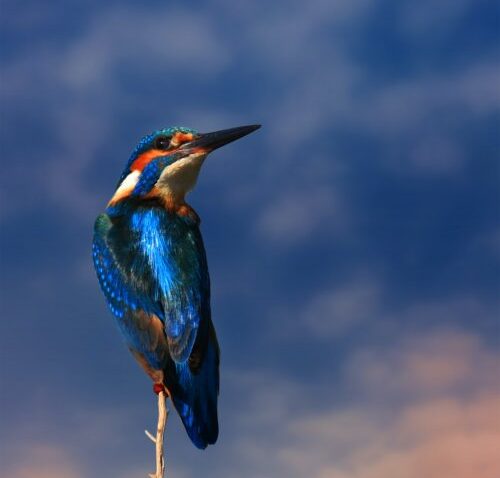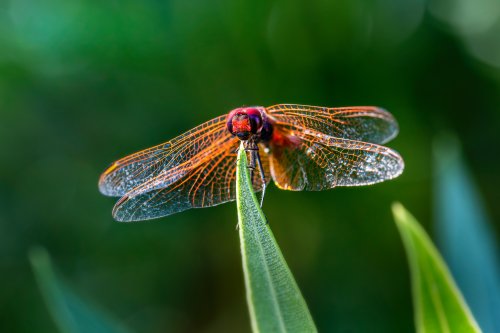Hopkins’ kingfishers and dragonflies
[NOTE: I decided not to be as politics-intensive as usual today.]
I consider the poems of Jesuit priest Gerard Manley Hopkins to be among the greatest, and I’m going to highlight a single line from his poem entitled—well, the poem has no title, so I’ll just give you the line:
As kingfishers catch fire, dragonflies draw flame…
If you’d like to have some visual images to go with the word images, here are photos of a kingfisher and a dragonfly:
Here’s the entire poem:
As kingfishers catch fire, dragonflies draw flame;
As tumbled over rim in roundy wells
Stones ring; like each tucked string tells, each hung bell’s
Bow swung finds tongue to fling out broad its name;
Each mortal thing does one thing and the same:
Deals out that being indoors each one dwells;
Selves – goes itself; myself it speaks and spells,
Crying What I do is me: for that I came.I say more: the just man justices;
Kéeps grace: that keeps all his goings graces;
Acts in God’s eye what in God’s eye he is –
Christ – for Christ plays in ten thousand places,
Lovely in limbs, and lovely in eyes not his
To the Father through the features of men’s faces.
No one ever said Hopkins was an easy poet. His work was almost entirely unknown during his lifetime, except to a few friends and colleagues, and only some of those select few even liked it. It was so very ahead of its time – Hopkins’ lifespan of 1844-1889 – that it was mostly considered just plain odd by those who did read it back then. And sometimes I think it’s even ahead of our time.
Nevertheless, at least a few of the people to whom Hopkins sent his poetry must have considered it worth something because, although Hopkins burned most of it when he entered the priesthood, he knew that some of his friends had copies, and at least one of them – Robert Bridges (future poet laureate of the UK) – preserved them. Although Bridges failed to convey much praise to his friend for his poetry during Hopkins’ lifetime, Bridges thought enough of it later on (1918) to publish it, long after Hopkins’ premature death.
In one of those ironies of which fate seems fond, Bridges’ poetry is pretty much forgotten these days, and he is remembered mostly for his role in preserving Hopkins’ work. It is Hopkins himself who is acknowledged (much like Emily Dickinson, another hidden poet) as one of the greatest poets the English language has ever known.
But that’s all background—it’s that first line I’m after:
As kingfishers catch fire, dragonflies draw flame
It is arresting on first reading it. But why? Well, it’s unusual, like almost all of Hopkins’ poetry. The imagery is lush and intense, emotional and sensual.
But it’s mostly the music of the language that gives it unusual force. That music is over-the-top too, although at the same time some of it is so subtle that the casual reader affected by it may never notice what Hopkins is actually up to. Some of the alliteration is obvious but some is partly hidden and done syllablically: the word “kingfishers” contains the “k” and then the “f” sound, followed by the words “catch” and “fire,” which start with those same sounds as well. Then Hopkins does the same thing with the “d” and “f” in “dragonflies” followed by “draw” and “flame.” You may not notice it, but you may respond to it, perhaps even without knowing to what you’re responding. And somehow, despite the extremity of the device, it’s saved from seeming contrived or sing-songy, because the words and images are so lovely and unexpected.
This celebratory poem (“and it was good”) was found among Hopkins’ papers after he died. It’s one of the few that was not sent to his friends, although it’s not clear why. Did he think it was one of his more inferior works? If so, the world has disagreed with him.



It’s hard to choose just one favorite of Hopkins’ poems, but this is one that I love:
The Windhover
I caught this morning morning’s minion, king-
dom of daylight’s dauphin, dapple-dawn-drawn Falcon, in his riding
Of the rolling level underneath him steady air, and striding
High there, how he rung upon the rein of a wimpling wing
In his ecstasy! then off, off forth on swing,
As a skate’s heel sweeps smooth on a bow-bend: the hurl and gliding
Rebuffed the big wind. My heart in hiding
Stirred for a bird, – the achieve of, the mastery of the thing!
Brute beauty and valour and act, oh, air, pride, plume, here
Buckle! AND the fire that breaks from thee then, a billion
Times told lovelier, more dangerous, O my chevalier!
No wonder of it: shéer plód makes plough down sillion
Shine, and blue-bleak embers, ah my dear,
Fall, gall themselves, and gash gold-vermilion.
A favorite: Walt Whitman ~ The Ox-tamer
In a far-away northern county in the placid pastoral region,
Lives my farmer friend, the theme of my recitative, a famous
tamer of oxen,
There they bring him the three-year-olds and the four-year-olds to
break them,
He will take the wildest steer in the world and break him and
tame him,
He will go fearless without any whip where the young bullock
chafes up and down the yard,
The bullock’s head tosses restless high in the air with raging eyes,
Yet see you! how soon his rage subsides—how soon this tamer
tames him;
See you! on the farms hereabout a hundred oxen young and old,
and he is the man who has tamed them,
They all know him, all are affectionate to him;
See you! some are such beautiful animals, so lofty looking;
Some are buff-color’d, some mottled, one has a white line running
along his back, some are brindled,
Some have wide flaring horns (a good sign)—see you! the
bright hides,
See, the two with stars on their foreheads—see, the round bodies
and broad backs,
How straight and square they stand on their legs—what fine
sagacious eyes!
How they watch their tamer—they wish him near them—how
they turn to look after him!
What yearning expression! how uneasy they are when he moves
away from them;
Now I marvel what it can be he appears to them, (books, politics,
poems, depart—all else departs,)
I confess I envy only his fascination—my silent, illiterate friend,
Whom a hundred oxen love there in his life on farms,
In the northern county far, in the placid pastoral region.
Not surprisingly, Hopkins is very highly regarded by literary Catholics and other Christians. Also by poets and academics, with an influence on the former which is definitely not always for the best. His style is so over the top and distinctive that anything that shows a strong influence from him is pretty obviously imitative and almost inevitably not as good. He was a huge favorite among my literary set back in the ’60s. There are at least two Christian literary magazines that take their names from him, Dappled Things and The Windhover.
I was for a long time puzzled by the kingfisher’s role in that poem, as the one I know is pretty ordinary in appearance. I think it’s the belted kingfisher. He does catch your eye by his very abrupt darting and a flash of white, but certainly nothing close to what Hopkins apparently saw.
https://en.wikipedia.org/wiki/Belted_kingfisher
I was also, like a lot of people, puzzled by “buckle!” in “The Windhover.” I’ve seen a fairly detailed explication of it but don’t remember now. You can assume that Hopkins had something very definite in mind. At first glance one might think his images are impressionistic but they’re the opposite. His notebooks are full of long excruciatingly detailed and precise descriptions of things like clouds.
The Creighton President wrote his thesis on Hopkins.
Rev. Daniel S. Hendrickson, SJ
Rev. Gerard Manley Hopkins, SJ
Them Jesuits, always conspiring 🙂 Creighton is a Jesuit school, as you probably know but others reading this may not.
One of my favorite Hopkins poems is “Spring and Fall,” which he inscribed “to a young child”:
Márgarét, áre you gríeving
Over Goldengrove unleaving?
Leáves like the things of man, you
With your fresh thoughts care for, can you?
Ah! ás the heart grows older
It will come to such sights colder
By and by, nor spare a sigh
Though worlds of wanwood leafmeal lie;
And yet you wíll weep and know why.
Now no matter, child, the name:
Sórrow’s spríngs áre the same.
Nor mouth had, no nor mind, expressed
What heart heard of, ghost guessed:
It ís the blight man was born for,
It is Margaret you mourn for.
Maybe it’s because of Hopkins’ stature as a poet– I was surprised to find out that he stood only 5′ 2″– short even for the Victorian period. I was not surprised, though, to find that he died in his mid-forties of typhoid fever, just like Prince Albert, Victoria’s husband. Public health still had a long way to go in the late nineteenth century.
As [k] (i) ng [f] (i)shers [k]atch [f](i)re, [dr](a)gon[fl] ies [dr](a)w [fl] (a)me
I wish I could use color. Punctuation alone doesn’t do the job. But I tried. Look at the K sounds in kingfisher, and then look at the I sounds. And then the DRs and the FLs and the As in the dragonflies. It may seem like a lot of pedantic nonsense, and possibly it is, except I don’t think so. I think all those echoes in the sounds, and also in how the words look on the page, set up a resonance that we feel as we read or listen, whether or not we register it on the surface.
And I forgot to add — there is a 1953 novel entitled Kingfishers Catch Fire, by Rumer Godden, set in India and semi-autobiographical, like almost everything she wrote. Full of shimmering language something like that of the Hopkins poem.
Robert Lowell’s answer to Hopkins’ kingfisher: “Colloquy in Black Rock”, first published in The Sewanee Review in 1944:
https://www.thesewaneereview.com/articles/robert-lowell-colloquy-in-black-rock
The last stanza (in a slightly revised version from Lowell’s second book, “Lord Weary’s Castle”):
Christ walks on the black water. In Black Mud
Darts the kingfisher. On Corpus Christi, heart,
Over the drum-beat of St. Stephen’s choir
I hear him, Stupor Mundi, and the mud
Flies from his hunching wings and beak–my heart,
The blue kingfisher dives on you in fire.
Black Rock is a neighborhood in Bridgeport, Connecticut. Not far from you, PA+Cat.
Among his Terrible Sonnets, many consider his best to be;
I wake and feel the fell of dark, not day.
What hours, O what black hours we have spent
This night! what sights you, heart, saw; ways you went!
And more must, in yet longer light’s delay.
With witness I speak this. But where I say
Hours I mean years, mean life. And my lament
Is cries countless, cries like dead letters sent
To dearest him that lives alas! away.
I am gall, I am heartburn. God’s most deep decree
Bitter would have me taste: my taste was me;
Bones built in me, flesh filled, blood brimmed the curse.
Selfyeast of spirit a dull dough sours. I see
The lost are like this, and their scourge to be
As I am mine, their sweating selves; but worse.
Jim in Alaska:
The terrible sonnets are amazingly good.